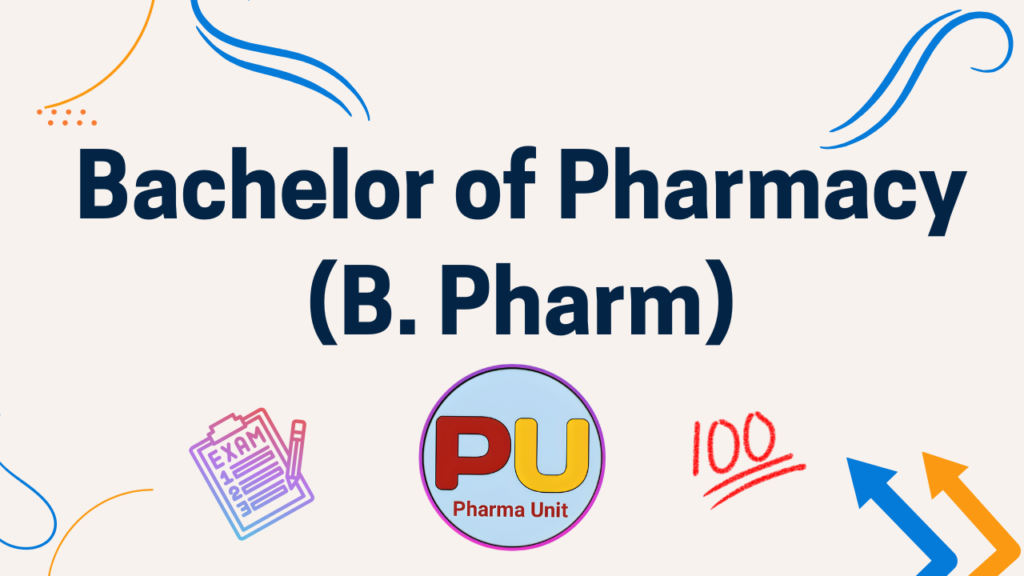Bachelor of Pharmacy (B. Pharm) is a four-year undergraduate degree that forms the academic foundation of the pharmacy profession. It is designed for students who want to work with medicines, healthcare systems, and the pharmaceutical industry. The course combines basic medical sciences with pharmaceutical technology and introduces students to how drugs are developed, manufactured, tested, regulated, and used in patients.

What is B. Pharm?
B. Pharm is a professional undergraduate program approved by the Pharmacy Council of India (PCI). It is the minimum qualification required to register as a pharmacist in India. The course focuses on drug formulation, pharmaceutical chemistry, pharmacology, quality control, and basic clinical pharmacy concepts. Students are trained through classroom teaching, laboratory work, and limited practical exposure to industry and healthcare settings.
The primary objective of B. Pharm is to produce graduates who understand medicines from both a scientific and regulatory perspective.
Eligibility Criteria for B. Pharm
Admission to the B. Pharm course requires completion of 10+2 with Physics and Chemistry as compulsory subjects, along with Biology or Mathematics. Most colleges require a minimum aggregate score, generally between forty-five and fifty percent, depending on institutional norms. Admission is commonly conducted through state-level or national-level entrance examinations, although some private institutions offer merit-based admission. These criteria ensure that students have a basic science background necessary for pharmaceutical studies.
Course Duration and Academic Structure
The duration of the B. Pharm course is four academic years, divided into eight semesters. The curriculum is structured to move from basic sciences in the early years to applied pharmaceutical subjects in later years. Students undergo regular laboratory practical’s, internal assessments, semester-end examinations, and a final-year project. Diploma in Pharmacy (D. Pharm) holders are eligible for lateral entry into the second year in many universities.
Subjects Covered in B. Pharm
In the initial years, students study foundational subjects such as human anatomy and physiology, biochemistry, pathophysiology, and pharmaceutical chemistry. As the course progresses, emphasis shifts to pharmacology, medicinal chemistry, pharmaceutics, pharmacognosy, microbiology, pharmaceutical jurisprudence, and quality assurance. In the final year, students are introduced to clinical pharmacy, pharmacokinetics, and research-oriented project work. The syllabus is designed to give broad exposure rather than deep specialization.
Career Opportunities After B. Pharm
After completing B. Pharm, graduates can work in multiple sectors related to medicines and healthcare. Common roles include community or retail pharmacist, hospital pharmacist, production or quality control executive in pharmaceutical companies, regulatory affairs assistant, and pharmacovigilance associate. B. Pharm graduates are also eligible for government positions such as drug inspector or pharmacist, subject to qualifying competitive examinations.
In research and documentation roles, graduates may work as medical writers, research assistants, or data reviewers. However, higher technical and academic positions usually require postgraduate qualifications.
Higher Studies After B. Pharm
B. Pharm serves as the entry point for advanced pharmacy education. Graduates can pursue M. Pharm for specialization, Pharm.D for clinical practice, MBA for management roles, or prepare for research-based careers through postgraduate and doctoral programs. Career growth after B. Pharm largely depends on whether the graduate chooses to specialize further.
Who Should Choose B. Pharm
B. Pharm is suitable for students interested in pharmaceutical sciences, drug manufacturing, quality systems, and regulatory frameworks. It is not ideal for students expecting extensive patient interaction or hospital-based clinical roles. Understanding this distinction early prevents unrealistic expectations.
Bachelor of Pharmacy is a foundational professional degree that opens doors to the pharmaceutical industry, regulatory bodies, healthcare services, and higher education. When chosen with clarity, B. Pharm becomes a strong base for long-term growth in the pharmacy profession.
Read about admission and eligibility for Masters in Pharmacy (M. Pharm)
